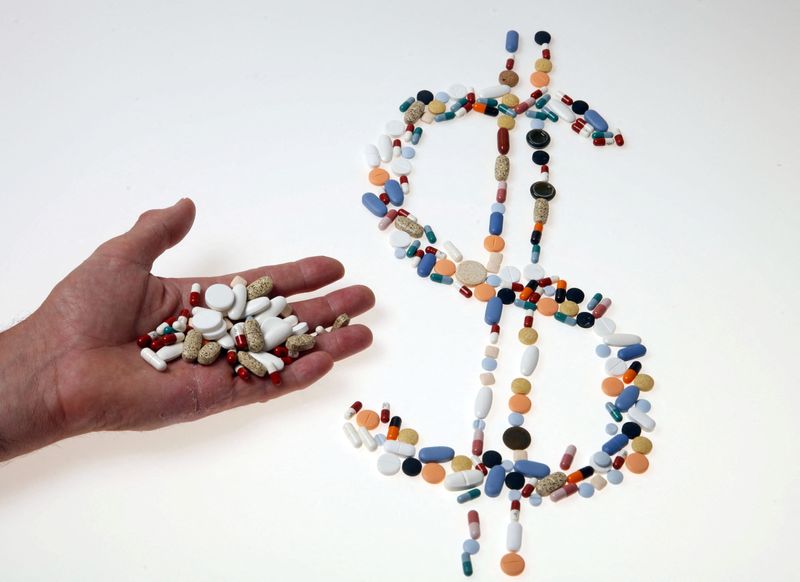By Patrick Wingrove and Michael Erman
(Reuters) - Four pharmaceutical companies involved in the first U.S. negotiations over prices for the Medicare program said they do not expect a significant impact on their businesses after seeing confidential suggested prices from the government for their drugs that will take effect in 2026.
Top executives from Bristol Myers (NYSE:BMY) Squibb, Johnson & Johnson (NYSE:JNJ), AbbVie (NYSE:ABBV) and AstraZeneca (NASDAQ:AZN), which have five of the 10 drugs chosen for the first wave of negotiations, described their newly informed views on quarterly conference calls.
The U.S. Medicare health program spends billions of dollars annually on drugs for 66 million people ages 65 and older or who have disabilities. It is expected to announce 2026 cuts to list prices of at least 25% by Sept. 1.
"I think the drugmakers were frightened (these prices) would be a big deal. But now, the ones who have reported or commented have actually said it seems to be OK and in line with expectations," UBS analyst Trung Huynh said in an interview.
Under President Joe Biden's Inflation Reduction Act, signed into law in 2022, the Medicare agency was required to identify the 100 most expensive drugs in the program and pick 10 for price negotiations that began last year.
Bristol Myers CEO Chris Boerner on Friday said the company was increasingly confident it could navigate the IRA's impact on the blockbuster blood thinner Eliquis it shares with Pfizer (NYSE:PFE), having seen the government price.
Still Boerner, along with AbbVie's CEO, reiterated industry concerns that the government was "price setting" under the program and that the practice would harm innovation.
Two analysts said they expected the government program to reduce the list prices of these drugs by between 50% and 60% based on drugmakers' comments.
It is common for drugmakers to provide discounts off the list price based on sales volume, but those discounts are not public.
Several drugmakers as well as industry lobbying groups PhRMA and the U.S. Chamber of Commerce filed lawsuits to stop the prices from going into effect, which have largely failed.
“As expected, price setting has been a flawed and political process," said Nicole Longo, spokeswoman for PhRMA.
She said the program has operated without making clear how it incorporates feedback from patients, providers, and manufacturers into the price, accusing it of putting government cuts ahead of patients.
AbbVie CEO Robert Michael said last week the company has included the expected sales hit to its blockbuster leukemia drug Imbruvica in its forecasts.
"We've come out and said that even with modeling that impact in, that we still expect to deliver on our long-term outlook," Michael said.
J&J executive Jennifer Taubert said the company's long-term growth forecast "still looks very good to us today," after seeing the discounts suggested by the government for its top-selling psoriasis drug Stelara and blood thinner Xarelto, which are among the first 10 chosen for negotiations.
J.P. Morgan analyst Chris Schott (ETR:1SXP) said in a note that comments by Bristol and J&J suggest they received more reasonable price cuts than initially feared.
The Centers for Medicaid and Medicare Services, which runs the program, did not respond to a request for comment.

An AstraZeneca executive last week said the company expected a limited impact because its diabetes drug Farxiga will face competition from cheaper generic drugs around three months after the new price takes effect in 2026.
At least five of the other drugs on the initial government list, including Merck & Co's diabetes drug Januvia and Amgen (NASDAQ:AMGN)'s rheumatoid arthritis treatment Enbrel, are expected to face generic competition by 2029, according to Guggenheim Partners analyst Vamil Divan.